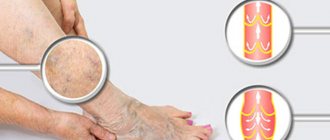All diseases are caused by nerves: visual evidence
In medicine there is a whole direction on psychosomatic diseases. Their development is provoked by a violation of the emotional state. For example, when a person reacts too violently to various life events. It doesn't matter whether they are positive or negative.
Cause and investigation
The fact is that our state of mind is a kind of “superstructure” over the brain. Through the central nervous system, it regulates the functioning of other body systems.
Article continues after advertisement
First of all - immune and endocrine. If violations occur in this superstructure, then the operation of other systems is at risk. Constant excessive emotions keep the body in a state of stress. As a result, stress hormones are produced in excess, then the entire hormonal balance is disrupted, the immune system is depressed and does not perform its functions. The body is mobilized to overcome stress: blood pressure rises, blood vessels spasm, pulse quickens, blood glucose levels rise...
Frivolous test: “Find your way to cope with stress”
It is very important to notice these disorders before they cause serious illness. At the initial stage, a person begins to experience some strange health problems. “Out of the blue” I’m worried about abdominal pain, intestinal disorders, urination problems, interruptions in heart rhythm, heart pain…
However, tests and other examinations may not show any deviations from the norm. Experts call this condition somatized emotional disorder.
Treatment is primarily the normalization of the emotional state. In this case, as if by magic, the unpleasant symptoms disappear. If you miss time, more serious disorders may begin to develop in the body. Most often, according to the principle “where it’s thin, it breaks.” Some people may get gastritis due to stress, while others may have heart problems.
Strange connection
Chinese doctors claim that certain emotions “hit” specific organs. For example, anger is according to the heart. There is little research in our medicine to judge this. But experienced doctors admit that such dependence does exist. Thus, liver disease is often accompanied by anger, stomach ulcers by irritability, and chronic stress can lead to the onset of Parkinson’s disease.
Attention: symptoms!
How to understand that your emotional state goes beyond the boundaries that are safe for health?
✓ You are too demanding of yourself and overreact to any criticism addressed to you. Regardless of whether they are objective or not. The heart begins to beat faster, breathing becomes irregular, the face turns red, the mood changes dramatically... By the way, the same applies to the reaction to compliments and praise.
✓ You are overcome by excessive anxiety. You worry about every little thing - trembling in your hands and a feeling of squeezing in your head. These are all signs of stress.
✓ Your blood pressure often rises, something somewhere constantly hurts. In addition, intestinal disorders or urinary disorders are a concern. But examinations show that everything is normal. It's time to see a neurologist!
Suppress or throw out?
It is believed that it is harmful to suppress anger, resentment and other negative emotions and it is better to throw them out. In fact, this is speculation. Any excessive and negative emotions, whether you “keep” them inside or throw them out, destroy the body.
Moreover, in many cases, spilling out negativity is even more harmful, as it leads to increased blood pressure and worsening stress. By the way, scientists have recognized ... crying as an effective method of relieving emotional stress. Unless, of course, you make him hysterical. But it’s much better not to let your emotions get the better of you. Remember not to worry too much about what has already happened. Or fantasize about non-existent events. Live in the present - today and now! If you can’t cope with your emotions, you should consult a psychologist.
What diseases are caused by frayed nerves?
✓ Bronchial asthma ✓ Stomach ulcer ✓ Coronary heart disease ✓ Intestinal microflora disorders ✓ Thyroid gland dysfunction ✓ Uterine fibroids in women ✓ Arterial hypertension
Fatigue has accumulated: learning to switch to rest
How to control yourself
1. The main principle of “emotional first aid” is distraction from your experiences.
2. Switch your attention using physical processes: clench your fists tightly and focus on these sensations. Take a deep, slow breath and exhale sharply and forcefully. Repeat several times.
3. If stress hits you at home, take a shower. The massage effect of water will help you switch.
Expert: Olga Sapronenkova, medical neurologist, candidate of medical sciences, associate professor
Are all diseases caused by nerves? - Damage from nerves
“All illnesses come from nerves” - we sometimes throw out a careless and hackneyed phrase, without attaching much meaning to it. But few people really think about whether this statement is genuine. But this is actually true - more than fifty percent of all kinds of disorders in the human body happen due to strong experiences, mental discomfort, depression and stress. Illnesses from the mind - fiction or reality?
You don’t need to go far to find such examples of the relationship between the mental well-being and the physical state of the body of its owner. Remember how you feel after a quarrel with a friend or a scandal with your husband. Your heart beats faster, blood rushes to your face, your breathing becomes irregular and you shake due to the adrenaline being produced. Various mental irritants greatly influence the state of the body , but not every person can draw a direct line between a daytime family quarrel and an evening migraine headache or increased blood pressure.
There is a special interpretation in medicine that explains the appearance of most diseases due to mental “problems”; it is called psychosomatics (from the words “psycho” - soul and “somo” - body). Doctors say that approximately 75% of absolutely all diseases of the human body are somehow related to mental disorders. To treat them, you should not take a bunch of different medications and do not carry out dozens of procedures; first you need to make a visit to a psychotherapist.
Having understood the real cause of the disease, changed his own view of things and started a different life, a person, contrary to the sometimes negative forecasts of a specialized specialist, recovers miraculously. There are many stories about this - but this is not a miracle at all, but a consequence of a psychosomatic approach to the method of treating diseases .
What diseases are caused by nerves?
But there are much more situations in which a person continues to suffer from an illness, taking medications and performing operations one after another, without thinking about the help of a psychotherapist. In this case, one of the main roles here is played by the so-called “disease memory” . If in distant childhood, for example, a person felt a serious shock and fell ill due to this (or there was simply malaise, some kind of physical disorder), the body will certainly remember both the circumstances (mental discomfort) and its own reaction to it (physiological disorders). And if a person already in adulthood feels similar emotions (resentment, anger, malice), the body will provoke the “launch” of a psychosomatic disease.
Such “starts” will be reproduced constantly if a person does not realize the real cause of his own physical disorders (which happens much less often) or does not take the help of specialists in psychosomatic diseases . As a rule, we continue to suffer from diseases, the cause of which is not a terrible environment or poor nutrition, but nerves.
In fact, it is much easier to convince yourself that the disease appeared due to anything but mental disorders. After all, putting your own psyche in order is quite a difficult task .
Of course, the help of a psychotherapist will not give a 100 percent guarantee that the disease will go away forever . If you have a chronic disease, it will be almost impossible to get rid of it. You should also take medications and carry out the necessary procedures. But the disease itself will no longer be so severe , and the prescribed treatment will give the long-awaited effect and relief for a long time. This is, of course, very important, since it often happens that even the best and most expensive medicines do not relieve a person’s pain, the disease worsens and contributes to the appearance of other diseases. And this is also the cause of psychosomatic disorders.
An additional reason that can trigger the disease mechanism is lack of satisfaction of needs . Detecting this is somewhat more difficult than childhood fears. Satisfying basic human needs is a necessity for each of us in life. There are four vital needs , and their dissatisfaction usually leads to the appearance of various diseases:
- food need (in any sense - food, material well-being, position in society) - such dissatisfaction can disrupt the functioning of the gastrointestinal tract;
- the need for security is the desire to have one’s own personal territory, reliable protection, rear - such dissatisfaction with it can lead to diseases of the cardiovascular system and respiratory tract;
- sexual need is the desire to be loved and to love, dissatisfaction leads to a variety of gynecological diseases, impotence in men, anorgasmia in women;
- parental need is a desire to take care of someone (parents, children, friends, animals), such dissatisfaction can cause hypertension, constant headaches and depression, and digestive problems.
Of course, there are diseases that are not associated with mental disorders and are “purely physical” diseases. First of all, these are hereditary diseases , which are caused by genetic predisposition. Next are life events (poisonings, injuries, burns and other accidents). Next, it may be an incorrect lifestyle (incorrect daily routine, bad habits, lack of proper rest, enormous mental and physical stress). It could also be an infectious disease . If the above reasons do not fit your illness, you should contact a psychosomatics specialist.
Diseases are often not only from nerves, but also from an inappropriate lifestyle - harm from smoking, drinking alcohol and poor nutrition.
By understanding the real cause of your own illness, getting inside yourself and putting things in order in your own mind, changing your attitude towards others, yourself and your whole life in general, you can get rid of the diseases tormenting you forever. After all, a healthy soul is a healthy body. Don't forget about it!
All diseases come from nerves
To say that literally all diseases are caused by nerves would be wrong. And although the relationship with “psychic” somatics can be traced in dozens of diseases, there are only six main “diseases from nerves”.
Firstly, these are colitis and gastritis. As a rule, they develop in people who love to make trouble, “shake their rights,” and who want to reprimand and scold “negligent” employees.
Here psychosomatics begins with banal heartburn. If after scandals you have heartburn and feel discomfort in the stomach area, then this is a fairly loud “bell”.
If this “bell” was not heard by you, then after some time you may find that you have a stomach or duodenal ulcer. Here it is worth paying attention to attacks of abdominal pain, the appearance of diarrhea or constipation, which are not associated with food intake, but appear after a stormy showdown.
Psychosomatic diseases include various dermatitis and other types of allergies. Allergic manifestations on the face occur in response to stress and constant irritation. Manifestations on the hands can develop due to psychological trauma or depression.
And the “typical set” of emotional states of an allergic person includes anger and excessive aggression. Torment due to past mistakes and unpleasant facts of reality, tension and remorse.
Neurasthenia and insomnia are other typical manifestations of psychosomatics. They, as a rule, accompany bilious people, bores and complainers, as well as those who worry about trifles.
A very serious consequence of “crazy” somatics is migraine. Usually it affects those who are dissatisfied with themselves and have low self-esteem.
Most of them are perfectionists, without a sense of humor, and during conflicts they are often “hysterical”, breaking into reproaches and screaming. Such aggression, both external and internal, leads to the fact that release at the muscle level does not occur.
Blood flow to the muscles decreases, and to the brain, on the contrary, increases. This excess blood flow becomes the root cause of headaches.
Psychosomatics: are all diseases caused by nerves?
“All diseases are from nerves, only syphilis is from pleasure!” There can be many objections to this common phrase. Firstly, from pleasure - not only syphilis, any venereologist will tell you the details, and secondly, not all diseases are explained by psychosomatics. Although the term “psychosomatics” will soon be two hundred years old (it was coined in 1818 by a German doctor named Heinroth), great minds still interpret it very differently.
There is, of course, a set of diseases whose psychosomatic nature is (almost!) beyond doubt: ulcerative colitis, hyper- and hypotension, gastritis, asthma, anorexia nervosa. And there is an opinion: “Be less nervous, and everything will pass!” But few people clearly understand what psychosomatic diseases actually are. The two most famous concepts of the origin of these “joys of life” are the theories of Franz Alexander and Sigmund Freud.
Yes, yes, Freud wrote not only about “strawberries”. He called his version of the origin of psychosomatic diseases conversion. The word “conversion” usually means turning something bad, outdated and unnecessary at the moment into something more relevant. Let's beat swords into ploughshares, they say. But during the conversion that Freud spoke about, something else happens: the transformation of bad into even worse: an internal conflict, without resolution, is transformed into certain physiological symptoms.
Please note: the internal conflict is not the conflict between pickles and kefir in your stomach, although the stomach is also inside. This is an intrapsychic conflict, a conflict of unconscious desires and prohibitions. For example, sometimes you really want to throw your boss out the window, beat your husband’s secretary on her painted head, drop everything and go to your aunt, into the wilderness, to Saratov... But these desires are so forbidden that they are not even realized. A person is not able to understand what he really wants, but experiences constant emotional discomfort. Thanks to the transfer from the mental to the physical, this dilemma is resolved, anxiety and restlessness go away.
From Freud's point of view, during conversion a person does not become ill with something random, but in each specific symptom a symbolic representation of what his experiences were associated with. For example, he explained psychosomatic visual and hearing impairments by a reluctance to see and hear the environment.
With the advent of a psychosomatic illness, a person, oddly enough, experiences relief.
This happens for three reasons:
- firstly, as mentioned above, the unconscious conflict is facilitated;
- secondly, illness makes it possible to receive various bonuses from the role of a patient (not going to hard work, bringing tea to bed, and in general everyone around you feels sorry);
- thirdly, the sequence of further actions immediately becomes clear: the eye does not see - drop drops, an ulcer with colitis appears - take almagels with diets, the heart is naughty - eat validolchik.
The picture is ideal: the person seems to be in business - he is being treated, the internal conflict recedes into the background. But the disease is not going to go away at all. Taking medications and treatment gives a feeling of gaining control over one's own life, which was lost as a result of a traumatic situation. By the way, often patients with psychosomatic diseases quite deliberately arrange breakdowns for themselves, especially in public situations. And the pain they experience is completely real. But the feeling of one’s own need is more important than health, albeit on a subconscious level.
Franz Alexander's theory (its traditional name is the “autonomic neurosis model”) is, in general, similar. The difference, perhaps, is that he places less emphasis on the symbolic meaning of individual symptoms, but rather appeals to other factors. For example, to genetic.
Roughly speaking, Alexander professes the principle: “where it is thin, it breaks.” Some are characterized by a not very healthy cardiovascular system, while others have a problem area - the lungs. It is these organs that will suffer first, regardless of the content of the internal conflict.
From Alexander’s point of view, illness does not even always weaken that same internal conflict, since it does not serve as an expression of emotions. For example, an increase in blood pressure in a state of rage does not weaken the rage, but is just a physiological symptom of this emotion. If a person is often in a state of rage, he may end up with chronic hypertension.
The debate about what is considered psychosomatic and what is not is not over yet. Some people are ready to consider everything psychosomatic except for labor fever and dropsy in the knee. Some people believe that psychosomatics is largely a myth, like the Placebo effect. From the point of view of some authoritative experts from both psychology and medicine, even such a terrible disease as cancer is psychosomatic. And, although there is a lot of evidence for this, neither official medicine, nor especially patients and their relatives are ready to accept this point of view - it is too terrible a diagnosis.
It is customary to treat psychosomatics as something frivolous. To something that a person can cope with himself, with one effort of will. Perhaps this is due to the fact that the term “psychosomatics” refers to ordinary simulation, which is fundamentally wrong. A psychosomatic disease is a disease that is based on both physiological and psychological causes, but at the same time it is a disease with all the symptoms that requires medical intervention.
Another thing is that the disease will not go away with traditional treatment alone, relapses will continue (in fact, relapse with adequate treatment is one of the hallmarks of psychosomatics), therefore the most correct approach to psychosomatic diseases is to work on the problem with a psychologist simultaneously with treatment.
In general, you can protect yourself from syphilis, and from nerves, and from psychosomatic disorders. If you find yourself thinking that getting sick would not be so bad, consult a psychologist to understand the situation, or try to find the irritant yourself and get rid of it, or, at worst, just rest.
_________________________________
Psychosomatics is the influence of psychological factors on the occurrence of medical diseases. Somatopsychiatry is the influence of past (or ongoing chronic diseases) on a person’s mental state.









